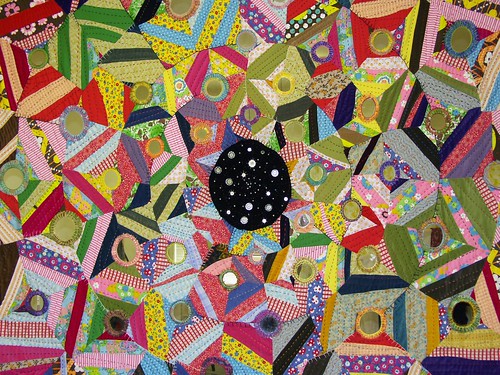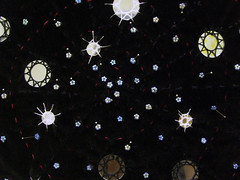The Modern Quilt: Revolution vs Evolution

After trolling the blogs late last night I came across Rossie's process pledge and post on mutant quilting (don't skip the insightful comments while you are there), and was inspired to consider my place in this movement.
I made my first quilt in 1988 and started quilting professionally in the early 90's after being inspired by an exhibition of African-American improvisational quilts. Curated by Eli Lion, Who'd A Thought It, included the work of Rosie Lee Tompkins among others. These quilts had the same amazing aesthetics as the quilts out of Gee's bend, an overwhelming sense of presence and intelligence. Improvisational process and community have been the keys to my work as a quilt maker and an artist ever since. I guess you could say I am a mutant quilter, since improv is all about the process of mutation.
It seems to me that the term "modern" as applied to quilts is mostly about branding. It's a label for the latest revolution, not necessarily evolution (or is it?) in quilt making. Re-imagining the lost traditions of our elders to find a more direct, hands-on way of life is a cultural trend. Today people in urban areas are into gardening, canning, and raising chickens in their back lots. We wrap our babies in cloth diapers and lay out our dead on the dining room table once again. Whether it's urban homesteading, natural burial, or modern quilting, we are searching the pre-tech era with hopeful eyes, for slower, simpler, more caring forms of existence. (My dad told me that all he did on Sundays as a small child in rural Indiana was attend church with his parents in the morning and wakes in the afternoon.)

There's nothing wrong with revolving and turning the corner to find more sustainable and satisfying ways of living life. I'm for revolution AND evolution. Revolution is defined as the action by a body of orbiting around a center axis, like the moon, but it can also mean a sudden, radical, or complete change. Evolution is defined as a gradual process in which something changes into a different and usually more complex or better form, in other words, the process of development. Revolution and evolution are not opposites. They go hand in hand. You can't have one without the other.
I've been quilting for 22 years, but blogging for only a month. This blog is all about process, and I'm not talking about the design process. I'm blogging about craft as a life practice. I am very pleased to find this topic of conversation beginning to bud on the web, and I'm happy to be a part of it.
Rowing the Boat:
Where do you place the modern quilt movement on the evolution/revolution scale? Or do you see it merely as a passing, pastime fad? How can we match revolutionary goals with evolutionary action? Any thoughts on the relationship between the two in your own process? Is it possible to evolve into LESS complex but better forms?... I hope to hear from you!Post photos: details from Godseye, 1996 by Sherri Lynn Wood
